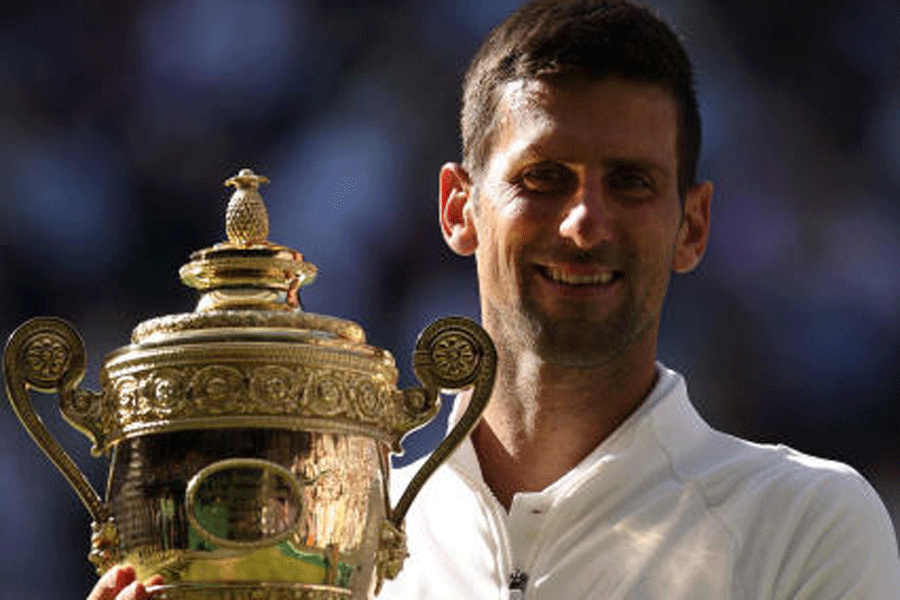Novak Djokovic marinated in the applause for a moment longer than usual after his Roland-Garros final on Sunday. He had, after all, just made history: a record-breaking 23rd grand slam title, breaking Rafael Nadal’s total of 22.
So Djokovic, in a jacket emblazoned with the number “23”, was entitled to revel in glory for a while. Before the trophy presentation, which he conducted with customary grace, he sat in his chair and shut his eyes, smiling at nothing in particular.
And then he was off, ready for the next grand slam. The journalists all wanted him to look back, to define his place in history and perhaps offer a crumb as to when this 36-year-old might put away his racket for good. “If I’m winning slams, why even think about ending the career that already has been going on for 20 years?” he said. “I look forward already to Wimbledon.”
Djokovic and his family — wife, Jelena, and children Stefan, eight, and five-year-old Tara — will likely move into a large rental home in Wimbledon within a week or two, ready for the tournament, which begins on July 3. Tennis players often name whatever grand slam they’re playing in next as their “favourite tournament”, but in Djokovic’s case, his love for Wimbledon seems genuine.
As a child born in what was then Yugoslavia, he used to dream about winning it. When he finally did, in 2011, he knelt down and ate a tuft of grass. “I felt like an animal. I wanted to see how it tastes,” he later said. “It tastes good.” So good he’s won it six more times since.
Yet, for all Djokovic’s success at the All England Club, there has always been a question over how much his love for the place is requited.
Not for nothing is “Why is Djokovic not liked at Wimbledon?” a query Google thinks you might be asking when you search his name and the tournament. Djokovic has always been a divisive figure in tennis; in SW19, the most genteel of postcodes, he’s closer to a pantomime villain.
The crowd has been known to cheer when he loses points and support whoever his opponent is regardless of who they are (he has said when people used to chant for Federer he would just pretend they were saying his name, hearing “Novak” instead of “Roger”). It’s not the first time Wimbledon has proved a tough crowd — John McEnroe could not be serious for a while, but got there in the end. Murray, after some grumpy moments as a teenager, won them over too — and now returns a hero.
So can Djokovic win over SW19?
Djokovic, who grew up in the shadow of war near Serbia’s border with Kosovo, slipped into the upper echelon of tennis at the end of the 2000s, breaking up the Federer-Nadal rivalry that Wimbledon crowds so adored.
The two Europeans were seen as gentlemen, pin-ups whose humility and quietness off the court matched their energy on it.
The other was Djokovic, an elastic scrap of a man with a shoe brush for hair and a playing style that would come to be defined as much by never-say-die defence as brilliant attack. He was “the Third Man”, and ruined the fun for “Fedal” fans.
Later, when he would play Andy Murray, the hometown (well, southwest London via Dunblane) hero, in Wimbledon finals, he was even more of a baddie.
“Djokob----”, other players used to call him, when he broke through. “I think he’s a joke,” Federer, himself in a rare moment of b----iness, said in 2007. The following year, Djokovic’s mother, Dijana, would declare “The king is dead, long live the king”, when her son beat Federer and looked set to replace him as world No 1. Later, when on-court tantrums, umpire disputes and crowd goading entered Djokovic’s game, the haters grew louder. “I’d like to see him show a bit more humility, like Nadal and Federer,” Roy Emerson, the Australian former champion, said in 2011.
But if one of Djokovic’s capabilities is to forget, another is to waste absolutely no energy trying to win over his critics – he would rather win matches.
Roddick famously said of Djokovic that “first he comes for your legs, and then he comes for your soul”. His current coach, Goran Ivanisevic, expanded on that on Sunday: “Then he digs your grave and you have a funeral and you’re dead. Bye-bye. Thank you for coming.” Compliments, all.
The Daily Telegraph in London











